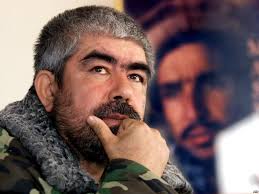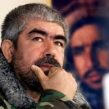
Will ‘Dostumistan’ Be Established Near Afghanistan’s Border With Uzbekistan?
Publication: Eurasia Daily Monitor Volume: 11 Issue: 45
By:

In January 2014, the chairman of the National Islamic Movement of Afghanistan party, General Abdul Rashid Dostum, a well-known politician and leader of ethnic Uzbeks in Afghanistan, made unofficial visits to Uzbekistan’s capital of Tashkent, the Kazakhstani capital of Astana, and Almaty—Kazakhstan’s largest city. According to most analysts, General Dostum was visiting these Central Asian countries in order to negotiate potential military and technical assistance. According to Nezavisimaya Gazeta, Dostum was also planning to visit the Kyrgyz Republic’s capital of Bishkek and Turkmenistan’s capital of Ashgabat, but his plans changed for unknown reasons and he quickly left Central Asia for India (Nezavisimaya Gazeta, on January 31).
General Dostum’s career reaches back to the period of the former Soviet Union. He studied in the Soviet military academy in 1988 and then served as the commander of the 53rd Afghan Infantry Division. Dostum and his division reported directly to then-president of Afghanistan, Mohammad Najibullah, but after the withdrawal of Soviet troops from the country, Dostum took up arms against Najibullah (Rossia newspaper, August 21, 2009).
After Taliban forces captured Kabul in September 1996, Dostum aligned himself with the anti-Taliban Northern Alliance. He stationed his troops—around 50,000 men, supported by both aircraft and tanks—in the city of Mazar-i-Sharif. With this force, the area under his control became a de-facto independent country inside the Taliban-controlled Afghanistan. He even set up his own ministry of foreign affairs and started issuing Afghan visas. The embassies of Russia, Iran, Uzbekistan, Turkmenistan and the consulate of Pakistan were then all located in Mazar-i-Sharif. Additionally, Dostum ran a small airline named Balkh Air. Central Asian and Russian journalists jokingly called this area “Dostumistan” (Nezavisimaya Gazeta, January 31; Rossia, August 21, 2009).
This author visited Mazar-i-Sharif in 1996, and witnessed that, unlike in the Taliban-controlled territories, people living in “Dostumistan” were able to watch television and play music. Many women did not wear the full burka and were able to attend classes at school and at the University of Mazar-i-Sharif. Furthermore, the author visited General Dostum’s army base in Mazar-i-Sharif. Interestingly, most of Dostum’s officers fluently spoke Russian as they had studied in Soviet military academies. Despite the Ramadan fast, the officers invited the author to have dinner in the day time and even to drink vodka with them.
At this point, during the mid- to late-1990s, Tashkent maintained close relations with Dostumistan. Uzbekistan’s President Islam Karimov even provided generous military and economic assistance to the leader of the Afghan Uzbeks, General Dustum. Moreover, Dostum’s soldiers would periodically withdraw across the border to the Uzbekistani town of Termez to recuperate after intense fighting in Afghanistan against Taliban forces. Indeed, the existence of Dostumistan was considered quite advantageous to authorities in Tashkent because this effective buffer state bordering on Uzbekistan protected the Central Asian republic from any encroaches by the Afghan Taliban. Illustrative of the close relationship between him and the authorities in Uzbekistan, Dostum has for many years owned a private residence in Tashkent, where all his family lives (Rossia, August 21, 2009).
According to Aleksei Malashenko, an expert at the Carnegie Center in Moscow, Abdul Rashid Dostum’s January 2014 visit to Uzbekistan and Kazakhstan was to remind these countries about himself. “Nobody knows how the events will unfold following the withdrawal of the US troops from Afghanistan [by late 2014],” Malashenko said, adding, “Apparently, Dostum wants to remain in politics [in Afghanistan] and to play an important role using the Central Asia factor [that is, his links in Uzbekistan, Kazakhstan and beyond]. He does not want to be written-off; his activism stems from this” (Nezavisimaya Gazeta, on January 31).
Alexander Knyazev, an Almaty-based coordinator of the Central Asia and Caucasus program at the Russian Institute of Oriental Studies, argues that General Dostum wants to establish close relations with the Kazakhstani authorities, starting with the security ministries, while also maintaining his ties to the authorities in Tashkent. Knyazev believes that during Dostum’s January visit to Astana, the Afghan general may have met with the chairman of Kazakhstan’s committee on national security, Nurtai Abikaev (Author’s interview, February 10).
Much as they did in the 1990s, the Uzbekistani authorities recognize the possible value a buffer state in the ethnically Uzbek region of Afghanistan—should one again be established there. “Dostum is one of the most secular politicians in Afghanistan and his policy is convenient for the Central Asia authorities. Nobody wants to see the Taliban near their borders,” said pro-government Uzbek political scientist Rafik Saifulin (Nezavisimaya Gazeta, on January 31).
“After the withdrawal of US troops, the probability of Afghanistan disintegrating into a few ethnic-based states is high,” the Russian Oriental Studies Institute’s Knyazev told Jamestown. “It is possible that Dostum discussed with Uzbek and Kazakh authorities the option of recreating a de-facto independent state in the Uzbek part of Afghanistan,” Knyazev posited (Author’s interview, February 10).
For now there appears to be no compelling evidence that either Tashkent or Astana are actively promoting recreating Dostumistan on Afghanistan’s borders with Central Asia. Nevertheless, Dostum’s trip is a clear indication that he is looking to expand his own political influence by seeking support from the other Central Asian governments. Moreover, his apparent meetings with top Uzbekistani and Kazakhstani security officials suggest that Tashkent and Astana are at least open to building ties with promising political figures in Afghanistan in preparation for the new situation on the ground after the Western forces’ withdrawal from the country. And Dostum’s growing influence is advantageous not only for Central Asian authorities, but also possibly for the Kremlin. Considering his roots in the Soviet military establishment, Dostum could serve as a useful tool for Moscow to reinforce its own political position in Afghanistan. However, the feasibility of all these sides’ strategies will likely not become fully apparent until after the Afghan presidential elections of April 2014 and the West’s complete military exit from the country.




